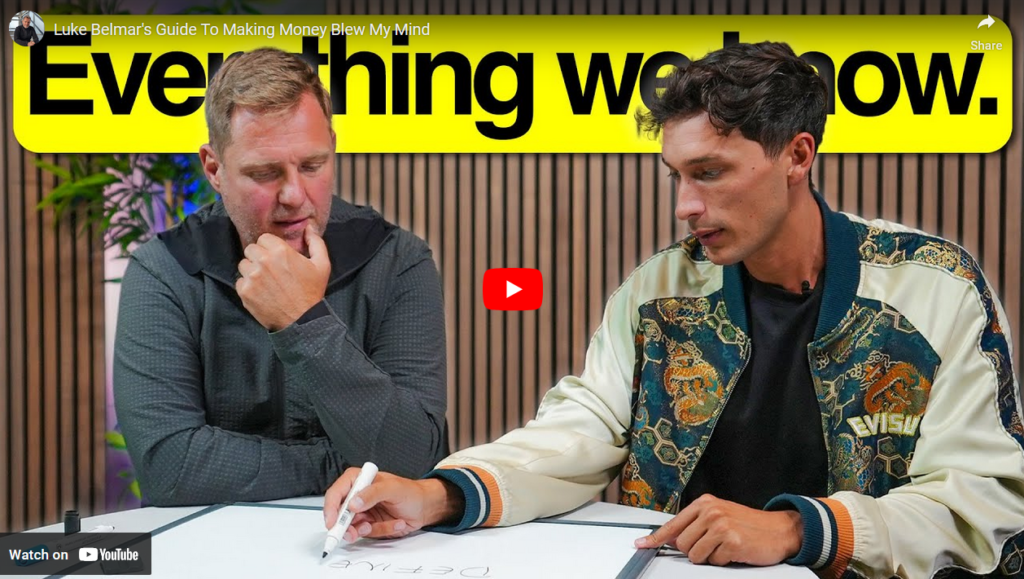SUMMARY
The speaker, a self-made multimillionaire who went from being homeless at 15 to selling his company to PricewaterhouseCoopers, shares a comprehensive guide on how to come up with and develop a million-dollar business idea with no initial capital. The video is structured into four main parts: the philosophy of business, starting a basic business, transitioning to an intermediate business, and finally scaling to a multimillion-pound business.
ONE-SENTENCE TAKEAWAY:
“Success comes from visualizing your dream, building patiently from small beginnings, investing in yourself, and prioritizing purpose over profit.”
IDEAS:
- Visualizing your dream business is the first step towards creating any successful venture.
- Purpose is foundational; everything in business starts with understanding your purpose.
- Retirement should not be the end goal; strive for a goal that excites you.
- Naming your dream gives it power and makes it more tangible.
- Luck can play a role in success, but preparation increases its impact.
- Role models can be more beneficial than mentors due to their inspirational value.
- Breaking down big ideas into manageable questions can help tackle seemingly insurmountable challenges.
- Patience and a step-by-step approach are crucial in business development.
- Starting small and focusing on what you’re good at can lead to bigger opportunities.
- Building a brand, not just a business, is essential for long-term success.
- Charging 50% upfront for services can secure financial stability and validate your business model.
- Equity in a company can be more valuable than immediate payment, especially for long-term goals.
- Gaining experience in a relevant job can provide insights and resources for your dream business.
- Selling a small business can provide capital and confidence for bigger ventures.
- Investing in yourself and your skills is more valuable than traditional investments like property.
- Building a community around your business can amplify your impact and reach.
- Personal branding is crucial for establishing credibility and attracting opportunities.
- A board of advisors can provide expertise, credibility, and networking opportunities.
- Selling is an essential skill for any entrepreneur, focusing on making personal connections.
- Building a business you love ensures passion and commitment, potentially leading to greater success.
INSIGHTS:
- The journey from conceptualizing to realizing a dream business involves visualizing the end goal, understanding your purpose, and taking actionable steps towards it.
- Success in entrepreneurship requires patience, resilience, and a willingness to start small and gradually build towards larger goals.
- Financial strategies such as charging upfront payments and seeking equity instead of immediate compensation can stabilize and grow a business with minimal initial capital.
- Personal development, through acquiring relevant experience and building a strong personal brand, is as crucial as business development.
- Community building and establishing a credible network are key components of scaling a business beyond its initial stages.
- The philosophy of “selling without wanting to sell” emphasizes the importance of passion over profit, suggesting that true success comes from building something meaningful rather than focusing solely on financial gain.
- Adopting a specialist role within your business allows for deeper expertise and innovation, setting the foundation for significant growth.
- The concept of “wax on, wax off” highlights the importance of foundational skills and experiences that indirectly prepare entrepreneurs for future challenges.
- Equity in businesses and strategic partnerships can offer unexpected avenues for growth and development, emphasizing the value of collaboration over competition.
- The ultimate goal of entrepreneurship should not be retirement or exit but creating lasting impact and fulfillment through one’s work.
ACTIONS PLAN:
- Visualize Your Dream Business Daily: Spend time each day imagining your ideal business, focusing on its impact, design, and the joy it brings you.
- Start Small with What You Know: Identify skills or interests you have that could translate into a small service or product offering.
- Implement the 50% Upfront Payment Rule: For any service you offer, require half payment upfront to stabilize cash flow.
- Build Your Brand: Start creating content related to your business idea—blog posts, social media updates, or videos—to establish your presence.
- Expand Your Network: Attend industry events, join relevant online forums, and connect with professionals who share your interests.
- Practice Selling Daily: Whether it’s pitching your idea to friends or negotiating terms with potential suppliers, refine your selling skills.
- Invest in Learning New Skills: Allocate time each week to learn something new that will directly benefit your dream business.
- Document Your Journey: Keep a journal or blog about your progress, challenges, and what you’re learning along the way.
- Offer Value Before Asking for Anything: Help others in your network without expecting immediate returns; build goodwill and relationships.
- Reflect on Your Progress Weekly: Set aside time each week to review what you’ve accomplished and adjust your plans accordingly.
HABITS:
- Regularly reflecting on their purpose to ensure alignment with their actions.
- Visualizing their dream business daily to maintain focus and motivation.
- Avoiding the trap of planning for retirement as their end goal.
- Being open to opportunities that may arise by chance and preparing for them.
- Choosing role models wisely and learning from their journeys without expecting direct mentorship.
- Breaking down big goals into manageable tasks and questions to tackle daily.
- Practicing patience and appreciating the value of gradual progress.
- Starting with small, manageable projects to build skills and confidence.
- Focusing on building a recognizable and trusted brand from the outset.
- Implementing a policy of charging 50% upfront for services to manage cash flow effectively.
- Seeking equity in collaborative projects instead of immediate compensation for long-term benefits.
- Prioritizing self-investment over traditional investments like property or stocks.
- Actively working on expanding their network with meaningful connections.
- Maintaining the mindset of building a business they love rather than one they plan to sell.
- Emphasizing personal selling skills by making connections personal and meaningful.
QUOTES:
- “Visualize your dream business now. I don’t care how crazy the idea is.”
- “Everything starts with purpose. It’s not a woo-woo word.”
- “Retirement is for those that hate what they do.”
- “Luck often happens when you’re prepared.”
- “Pick a role model, not a mentor.”
- “You can’t move a mountain, but you can move it one small rock at a time.”
- “Be patient. It’s a step-by-step process.”
- “Think small to get big.”
- “Build a brand, not just a business.”
- “Charge 50% upfront for services as a deposit.”
- “Equity where you work can be more valuable than immediate payment.”
- “Invest in yourself, not stocks or property.”
- “Your network is your net worth.”
- “Build something you never need to sell.”
- “Sell the vision, not just the product.”
FACTS:
- The speaker went from homelessness at 15 to becoming a multimillionaire by selling his company to PricewaterhouseCoopers.
- He achieved his success without initial capital, relying instead on acquired knowledge and strategic approaches.
- The philosophy of not making retirement the end goal challenges conventional career planning.
- The importance of purpose in business is emphasized as foundational rather than an abstract concept.
- The strategy of charging 50% upfront for services is presented as a practical financial management technique.
- Equity participation is highlighted as an alternative compensation method that can offer long-term benefits.
- The speaker advocates for investing in oneself as the most valuable form of investment over traditional options like property or stocks.
- Building a community around one’s business is identified as a key strategy for amplifying impact and reach.
- Personal branding is recognized as crucial for establishing credibility and attracting opportunities in today’s market.
- The concept of selling without the intention to sell underscores the importance of passion over profit in entrepreneurship.
RECOMMENDATIONS:
- Focus on building something you love rather than aiming for retirement.
- Start visualizing your dream business today; no idea is too big or too small.
- Charge 50% upfront for any service you offer to ensure financial stability.
- Look for role models instead of mentors; learn from their journeys.
- Be patient; success in business is a step-by-step journey.
- Break down big goals into manageable tasks; tackle them one at a time.
- Think small to achieve big; start with what you’re good at.
- Build a brand from the beginning; it’s more valuable than just a business.
- Consider equity over immediate payment for long-term benefits.
- Invest in yourself; it’s the best investment you’ll ever make.
- Expand your network intentionally; it’s crucial for growth.
- Document your journey; it builds credibility and personal brand.
- Learn to sell by making personal connections; it’s key in every stage.
- Build a community around your business; it amplifies impact.
- Never lose sight of your purpose; it’s what makes your business meaningful.
REFERENCES:
- PricewaterhouseCoopers (PwC) – The company the speaker sold his business to.
- Gardening Company – An example of starting small with what you know.
- Help Bank.com – A venture mentioned by the speaker as an example of building something meaningful.
- Karate Kid – Referenced by the speaker to illustrate the concept of foundational skills leading to mastery.
- Wine Library & Gary Vee – Examples of starting with simple concepts that grow into large brands.
- Mr Beast – Mentioned as an example of someone who turned simple actions into massive success through dedication.
- Stanford – As part of discussing building a board of advisors with aligned purposes.
- Amazon Bestseller List – Where the speaker’s book achieved number one status by selling the vision.


